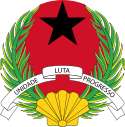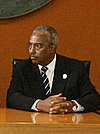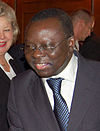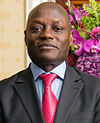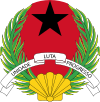
Luís Severino de Almeida Cabral was the first President of Guinea-Bissau. He served from 1974 to 1980, when a military coup d'état led by João Bernardo Vieira deposed him. Luís Cabral was a half-brother of Amílcar Cabral, with whom he co-founded the African Party for the Independence of Guinea and Cape Verde (PAIGC) in 1956.
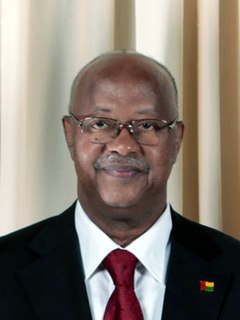
Presidential elections were held in Guinea-Bissau on 18 March 2012 following the death of President Malam Bacai Sanhá on 9 January. A run-off was set to be held on 29 April after being postponed by a week as announced by electoral commission chief Desejado Lima Dacosta. However, after a military coup, the leading candidates were arrested and the election was cancelled. The junta's spokesman then announced plans to hold an election in two years, despite condemnation. General elections were subsequently held in April 2014.
This name uses Portuguese naming customs: the first or maternal family name is Djaló and the second or paternal family name is Nandigna.

On 12 April 2012, a coup d'état in Guinea-Bissau was staged by elements of the armed forces about two weeks before the second round of a presidential election between Carlos Gomes Júnior and Kumba Ialá. The coup started in the evening with military personnel and equipment making its way onto the streets, followed by the state-owned media being taken off-air.

José Mário Gómes Vaz is the President of Guinea-Bissau, in office since 23 June 2014.
The following lists events that happened during 2012 in Guinea-Bissau.

The 1980 Guinea-Bissau coup d'état was the bloodless military coup that took place in Guinea-Bissau on 14 November 1980, led by Prime Minister General João Bernardo Vieira. It led to the deposition of President Luís Cabral, who held the office since 1973, while the country's War of Independence was still ongoing. Furthermore, it resulted in the abandonment of the proposed unification of Guinea-Bissau with Cape Verde, a fellow Lusophone West African country. The Cape Verdean branch of the PAIGC party broke away and formed the new PAICV party in January 1981 under the leadership of Aristides Pereira, President of Cape Verde and former Secretary-General of the PAIGC.

The 2003 Guinea-Bissau coup d'état was the bloodless military coup that took place in Guinea-Bissau on 14 September 2003, led by General Veríssimo Correia Seabra against incumbent President Kumba Ialá. Seabra referred to the "incapacity" of Ialá's government as justification for the takeover, together with a stagnant economy, political instability, and military discontent over unpaid salaries. Ialá publicly announced his resignation on 17 September, and a political agreement signed that month prohibited him from participating in politics for five years. A civilian-led transitional government led by businessman Henrique Rosa and PRS secretary general Artur Sanhá was set up at the end of September.
This page is based on this
Wikipedia article Text is available under the
CC BY-SA 4.0 license; additional terms may apply.
Images, videos and audio are available under their respective licenses.
